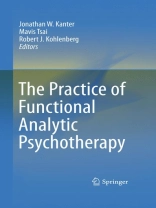Since the earliest years of its development, Functional Analytic Psychotherapy (FAP) has been hailed for its clinical innovation and transformative power with clients across the range of disorders. Building on the foundations of their earlier volumes about this versatile therapy, the editors of The Practice of Functional Analytic Psychotherapy bring together noted clinicians and researchers to explain in depth how FAP can be used in conjunction with a broad spectrum of therapeutic approaches, and with diverse client populations. The hallmarks of the method, including therapist sensitivity and responding to client behavior in the moment, courage, mindfulness, acceptance, and egalitarianism, inform a wide array of interventions and strategies, among them:
- Integrating FAP with other treatments, including cognitive behavioral therapy, acceptance and commitment therapy, dialectical behavior therapy, behavioral activation, psychodynamic therapies, and feminist therapies.
- Applying FAP across cultures, nationalities, and ethnicities.
- Employing FAP with couples.
- Increasing sensitivity to and effectiveness with sexual minority clients.
- Modifying FAP for developmentally appropriate use with adolescents.
- Enhancing a team approach with severely mentally ill patients in institutional settings.
- Strengthening the power of interpersonal process groups.
As a new tool or an enhancement to current practice, these applications of FAP will give therapists an empowering complement to their work. The Practice of Functional Analytic Psychotherapy points to compelling directions in personal growth and change—on both sides of the therapeutic bond.
Table of Content
to the Practice of Functional Analytic Psychotherapy.- to the Practice of Functional Analytic Psychotherapy.- FAP and Psychotherapy Integration.- FAP and Cognitive Behavior Therapy Cognitive Behavior Therapy .- FAP and Acceptance Commitment Therapy (ACTAcceptance Commitment Therapy (ACT ): Similarities, Divergence, and Integration.- FAP and Dialectical Behavior Therapy (DBT)Dialectical Behavior Therapy (DBT) .- FAP and Behavioral Activation Behavioral Activation .- FAP and Psychodynamic Therapies Psychodynamic Therapies .- FAP and Feminist Therapies Feminist Therapies : Confronting Power and Privilege in Therapy.- FAP Across Settings and Populations.- FAP-Enhanced Couple Therapy FAP-Enhanced Couple Therapy : Perspectives and Possibilities.- FAP with Sexual Minorities Sexual Minorities .- Transcultural FAP.- FAP Strategies and Ideas for Working with Adolescents Adolescents .- The Application of FAP to Persons with Serious Mental Illness Mental Illness .- FAP with People Convicted of Sexual Offenses Sexual Offenses .- FAP for Interpersonal Process Groups Interpersonal Process Groups .
About the author
Jonathan W. Kanter, Ph.D., is an Associate Professor of Psychology and Coordinator of the Psychology Clinic at the University of Wisconsin-Milwaukee (UWM). He directs the Depression Treatment Specialty Clinic which is collaboration between UWM and the Medical College of Wisconsin. His research focuses on behavioral and behavior analytic approaches to understanding and treating depression, with particular emphases on Functional Analytic Psychotherapy (FAP) and Behavioral Activation (BA), and an additional research interest in stigma related to depression. His research goal is to increase access to quality services for ethnic minorities and the underserved. He has written or co-edited five books on these topics, published over 50 articles and chapters, and currently is Principal Investigator and Co-Investigator on two National Institute of Health grants to study Behavioral Activation. He has presented numerous workshops on FAP and provides clinical supervision in both FAP and BA. e-mail: [email protected]
Mavis Tsai, Ph.D., co-originator of FAP, is a clinical psychologist in independent practice. She is also Director of the FAP Specialty Clinic within the Psychological Services and Training Center at the University of Washington, where she is involved in teaching, supervision and research on treatment development. Her publications and presentations include work on healing posttraumatic stress disorder interpersonal trauma with FAP, disorders of the self, power issues in marital therapy, incorporating Eastern wisdom into psychotherapy, racism and minority groups, teaching youth to be peace activists, and women’s empowerment via reclaiming purpose and passion. She is on the Fulbright Senior Specialists Roster, has presented ‘Master Clinician’ sessions at the Association for Behavior and Cognitive Therapy, and has led numerous workshops nationally and internationally. She is interested in behaviorally informed multi-modal approaches tohealing and growth that integrate mind, body, emotions and spirit. e-mail: [email protected]
Robert J. Kohlenberg, Ph.D., ABPP, co-originator of FAP, is a professor of psychology at the University of Washington, where he held the position of Director of Clinical Training from 1997 to 2004. The Washington State Psychological Association honored him with a Distinguished Psychologist Award in 1999. He is on the Fulbright Senior Specialists Roster, and has presented ‘Master Clinician’ and ‘World Round’ sessions at the Association for Behavioral and Cognitive Therapies. He has presented FAP workshops both in the United States and internationally, and has published papers on migraine, obsessive-compulsive disorder, depression, intimacy of the therapeutic relationship, and a FAP approach to understanding the self. He has attained research grants for FAP treatment development, and his current interests are identifying the elements of effective psychotherapy, the integration of psychotherapies, and the treatment of co-morbidity. e-mail: [email protected]












